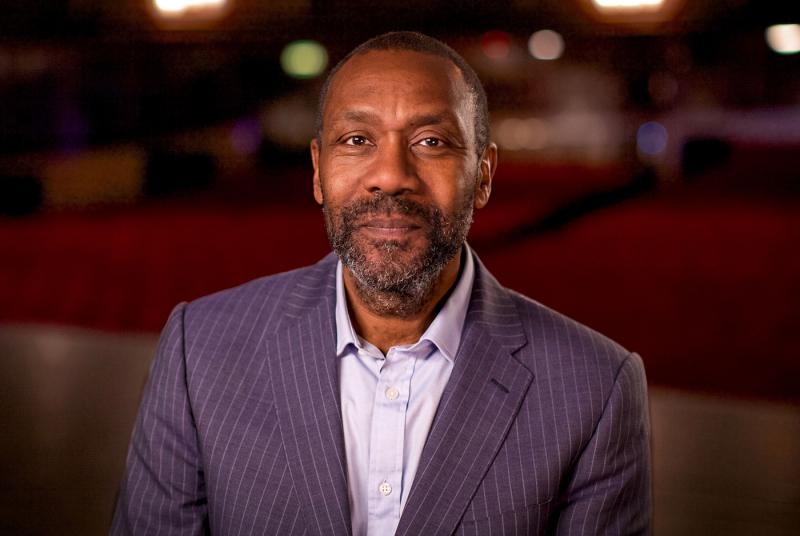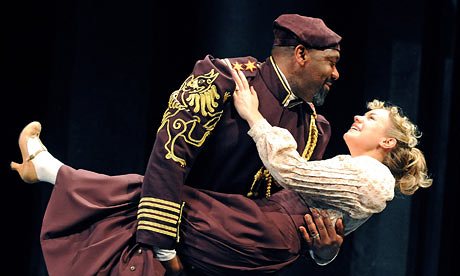Lenny Henry: A Life on Screen, BBC Two | reviews, news & interviews
Lenny Henry: A Life on Screen, BBC Two
Lenny Henry: A Life on Screen, BBC Two
The long march from the West Midlands to the West End

You couldn’t make him up – a big man in every sense, outspoken, spiky, adored, coming from a black working-class family to move from the proverbial nothing to become so much more than something. How to make a documentary tribute without it being sycophantic or a hagiography? By putting the man centre stage. Arise, Sir Lenny, the subject of a BAFTA tribute.
We were given a straightforward chronological narrative from our star, sitting alone on a vast and empty stage, looking to camera, no interviewer visible. His informal monologue was interspersed with clips from stage, screen and television and interviews with colleagues and collaborators. Among them were Sir Michael Grade who commissioned Lenny for ITV, Richard Curtis, screenwriter and co-founder with Lenny of Comic Relief, fellow performer Griff Rhys Jones, and Sir Trevor McDonald, hero first and then as now a close friend (Red Nose Lenny, pictured below).
 Born in Dudley, West Midlands, his mother a recent immigrant from Jamaica – they had heard in the West Indies that you could make as much as 30 shillings a week working in the UK – he went to school just down the road as his mother could see it from their house. They were a big family, and though Lenny only learned later that his mother’s husband was not his biological father, they were always close.
Born in Dudley, West Midlands, his mother a recent immigrant from Jamaica – they had heard in the West Indies that you could make as much as 30 shillings a week working in the UK – he went to school just down the road as his mother could see it from their house. They were a big family, and though Lenny only learned later that his mother’s husband was not his biological father, they were always close.
They were among the first wave of immigrants, a tiny minority then in Dudley, and Lenny discovered that he had a talent for mimicry and comedy: he called himself a comedy jukebox, and he killed his friends with his improvised acts. The teenagers crowded into the Queen May ballroom in Dudley, illicitly smoking, drinking and listening to music, where Lenny experienced the addictive lure of performing and fell for what he saw as the joys of show business.
He bunked off school, his mother all unknowing, and got to Birmingham to audition for New Faces. He wowed them with his take on Tommy Cooper. His back to the audience, red fez on his head, he slowly turned around: “You’ve heard this impression before, but not in colour.” He was on the television aged 16 in 1975, and his world changed forever. In Leicester a Jamaican bus driver initiated a traffic jam in the centre of the town by stopping his bus and getting off to congratulate Lenny on his TV appearances.
As Michael Grade remarked, at the time there were hardly any black faces on view. Henry, under the guidance of his first agent, even appeared in The Black and White Minstrel Show, the programme that became infamous for white men blacking up. He said frankly he had accepted out of ignorance and fear, feeling that he had to take anything that came his way.
The career unrolled, clip by tantalising clip: The Fosters, a black family sitcom, playing the clubs, then Tiswas with Chris Tarrant, with Lenny’s beloved mum baking Christmas cakes which, Tarrant said, were probably 96 percent rum. Even the real McDonald turned up to surprise Lenny doing his sterling imitation. On to Three Of a Kind and The Lenny Henry Show, featuring his improbably convincing Tina Turner, and Beyoncé rolling about in a tight dress and high heels. He branched out into writing, a film company, and an unsuccessful foray into Hollywood. This century has seen an ambitious and exhilarating sideways move into Shakespeare, with Othello followed by The Comedy of Errors at the National. Strangely, I didn't hear any mention of his amazing role in August Wilson’s Fences, as yet his only West End theatre appearance (Henry in Othello at West Yorkshire Playhouse, pictured above).
He branched out into writing, a film company, and an unsuccessful foray into Hollywood. This century has seen an ambitious and exhilarating sideways move into Shakespeare, with Othello followed by The Comedy of Errors at the National. Strangely, I didn't hear any mention of his amazing role in August Wilson’s Fences, as yet his only West End theatre appearance (Henry in Othello at West Yorkshire Playhouse, pictured above).
From 1988 there has been the continuing commitment to Comic Relief, a genuine engagement with the dispossessed and poverty-stricken. For himself lately he has done an Open University degree in English, with more degrees to follow, and a new public campaign for more diversity in the arts, explosing the lack of representation both behind the scenes and upfront.
His immense attractiveness, even charisma, burst forth from the screen. What was clear was an uncanny intelligence, extraordinary resolve, and a determination to try almost anything. It also seemed his talent was fully formed from the beginning, as though he sprang straight into stardom.
And yet all remained tantalisingly mysterious. Where did the urge to do so much and that almost maniacal energy come from, how did he pick up in his early teen years on the stars he imitated with such virtuosity, where did the enviable zeal for effective campaigning come from? And nothing but nothing was said about his personal life beyond his adolescence: the anecdotes were all about professional moments.
The future of Arts Journalism
You can stop theartsdesk.com closing!
We urgently need financing to survive. Our fundraising drive has thus far raised £33,000 but we need to reach £100,000 or we will be forced to close. Please contribute here: https://gofund.me/c3f6033d
And if you can forward this information to anyone who might assist, we’d be grateful.

Subscribe to theartsdesk.com
Thank you for continuing to read our work on theartsdesk.com. For unlimited access to every article in its entirety, including our archive of more than 15,000 pieces, we're asking for £5 per month or £40 per year. We feel it's a very good deal, and hope you do too.
To take a subscription now simply click here.
And if you're looking for that extra gift for a friend or family member, why not treat them to a theartsdesk.com gift subscription?
more TV
 The Rise and Fall of Michelle Mone, BBC Two - boom and bust in the lingerie trade
Life in the fast lane with David Cameron's entrepreneurship tsar
The Rise and Fall of Michelle Mone, BBC Two - boom and bust in the lingerie trade
Life in the fast lane with David Cameron's entrepreneurship tsar
 Code of Silence, ITVX review - inventively presented reality of deaf people's experience
Rose Ayling-Ellis maps out her muffled world in a so-so heist caper
Code of Silence, ITVX review - inventively presented reality of deaf people's experience
Rose Ayling-Ellis maps out her muffled world in a so-so heist caper
 The Bombing of Pan Am 103, BBC One review - new dramatisation of the horrific Lockerbie terror attack
Six-part series focuses on the families and friends of the victims
The Bombing of Pan Am 103, BBC One review - new dramatisation of the horrific Lockerbie terror attack
Six-part series focuses on the families and friends of the victims
 theartsdesk Q&A: Zoë Telford on playing a stressed-out psychiatrist in ITV's 'Malpractice'
She nearly became a dancer, but now she's one of TV's most familiar faces
theartsdesk Q&A: Zoë Telford on playing a stressed-out psychiatrist in ITV's 'Malpractice'
She nearly became a dancer, but now she's one of TV's most familiar faces
 The Trunk, Netflix review - stylish, noir-ish Korean drama wrapped around a beguiling love story
Unusual psychological study of a stranger paid to save a toxic marriage
The Trunk, Netflix review - stylish, noir-ish Korean drama wrapped around a beguiling love story
Unusual psychological study of a stranger paid to save a toxic marriage
 Malpractice, ITV1, Series 2 review - fear and loathing in the psychiatric unit
Powerful return of Grace Ofori-Attah's scathing medical drama
Malpractice, ITV1, Series 2 review - fear and loathing in the psychiatric unit
Powerful return of Grace Ofori-Attah's scathing medical drama
 Fake, ITV1 review - be careful what you wish for
Australian drama probes the terrors of middle-aged matchmaking
Fake, ITV1 review - be careful what you wish for
Australian drama probes the terrors of middle-aged matchmaking
 Formula E: Driver, Prime Video review - inside the world's first zero-carbon sport
F1's electric baby brother get its own documentary series
Formula E: Driver, Prime Video review - inside the world's first zero-carbon sport
F1's electric baby brother get its own documentary series
 Flintoff, Disney+ review - tumultuous life and times of the great all-rounder
John Dower's documentary is gritty, gruelling and uplifting
Flintoff, Disney+ review - tumultuous life and times of the great all-rounder
John Dower's documentary is gritty, gruelling and uplifting
 Your Friends & Neighbors, Apple TV+ review - in every dream home a heartache
Jon Hamm finds his best role since 'Mad Men'
Your Friends & Neighbors, Apple TV+ review - in every dream home a heartache
Jon Hamm finds his best role since 'Mad Men'
 MobLand, Paramount+ review - more guns, goons and gangsters from Guy Ritchie
High-powered cast impersonates the larcenous Harrigan dynasty
MobLand, Paramount+ review - more guns, goons and gangsters from Guy Ritchie
High-powered cast impersonates the larcenous Harrigan dynasty
 This City is Ours, BBC One review - civil war rocks family cocaine racket
Terrific cast powers Stephen Butchard's Liverpool drug-ring saga
This City is Ours, BBC One review - civil war rocks family cocaine racket
Terrific cast powers Stephen Butchard's Liverpool drug-ring saga

Add comment